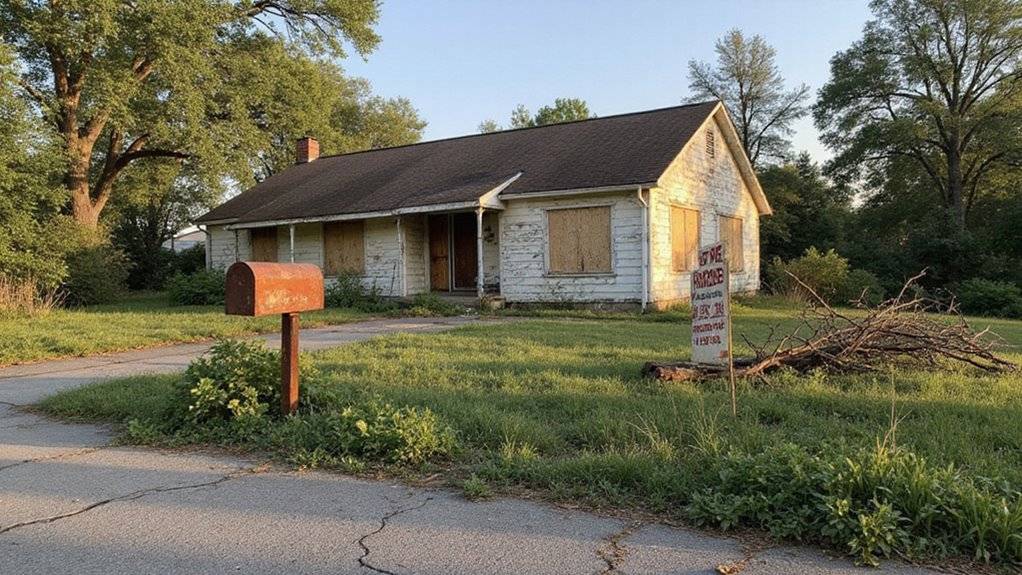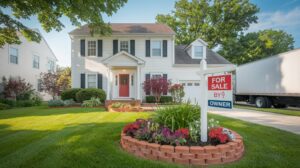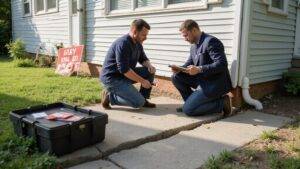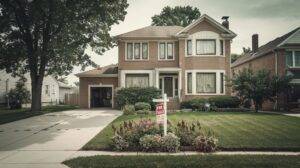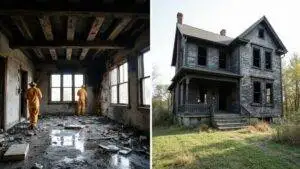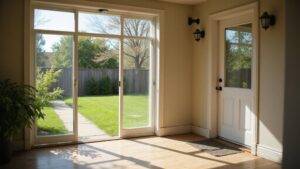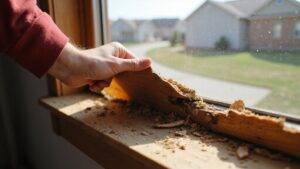Vacant homes can quickly lose value and become a burden for owners and communities. When no one lives in a house, small problems can grow unnoticed. Issues like leaks, pests, and break-ins can quickly damage the property.
These risks can make homes less attractive and lower their selling prices. Neighbors may start to avoid the area, making things even worse. Insurance can also become more expensive for empty homes.
Vacant homes lose value because damage, crime, and neglect happen faster without regular care. Owners should check properties or hire people to watch them.
Simple maintenance and security steps can protect a home’s value. This blog will show how to keep vacant homes safe and avoid losing money over time.
Key Takeaways
- Physical deterioration accelerates in vacant homes due to unchecked leaks, pests, and mold, causing costly damage and rapid loss in property value.
- Vacant properties are more vulnerable to vandalism, theft, and graffiti, which decrease curb appeal and further reduce market value.
- Lack of regular maintenance leads to declining curb appeal, overgrown landscaping, and visible neglect, making the home less attractive to buyers.
- Vacant homes often face higher insurance costs and stricter policy requirements, increasing ownership expenses and risk of underinsured losses.
- Prolonged vacancy can result in legal issues, unpaid taxes, and code violations, creating barriers to sale and further decreasing property worth.
Accelerated Wear and Tear
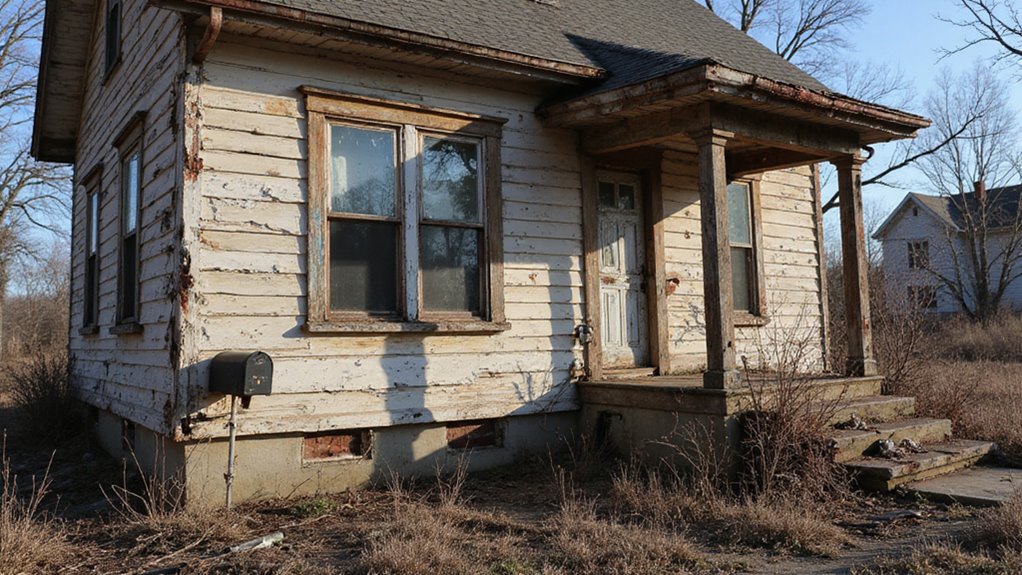
Accelerated wear and tear can happen even if a home is empty. Empty homes often develop problems faster because there is no one to notice issues. Small problems like leaks or pests can get worse quickly without regular checks.
Vacant homes may also attract vandals or squatters if left alone. These risks can lead to expensive repairs and lower property value. If a home stays empty for over 60 days, it could lose up to 10% of its value. Choosing a stress-free selling process can help homeowners avoid losing value and eliminate worries about ongoing maintenance.
Regular inspections help catch issues early and protect your investment. Good home security also helps prevent break-ins and damage. If you want to avoid these problems, it is important to check on the property often. Selling to cash home buyers is a fast way to avoid the risks of vacant home depreciation and costly repairs.
Increased Risk of Water Damage
Vacant homes face a higher risk of water damage because no one is there to spot issues quickly. Leaks, burst pipes, or broken appliances can go unnoticed and cause serious harm. Even small problems may lead to costly repairs if left unchecked.
Insurance data shows that water damage claims average about $10,000 for each case. Homeowners can lower risks by turning off the main water supply and installing smart leak detectors. Local investors who understand the area can help homeowners navigate these risks by offering solutions for selling homes as-is. Regular inspections also help to catch problems early.
If you use waterproofing methods, such as sealing basement walls, your home will be better protected. Water-resistant materials add another layer of defense. Ignoring these steps can lead to more frequent and severe water damage, harming your property’s value. If you’re looking for a stress-free selling process that helps you avoid costly repairs from water damage, consider companies that buy homes as-is and manage all details for you.
Mold and Mildew Growth
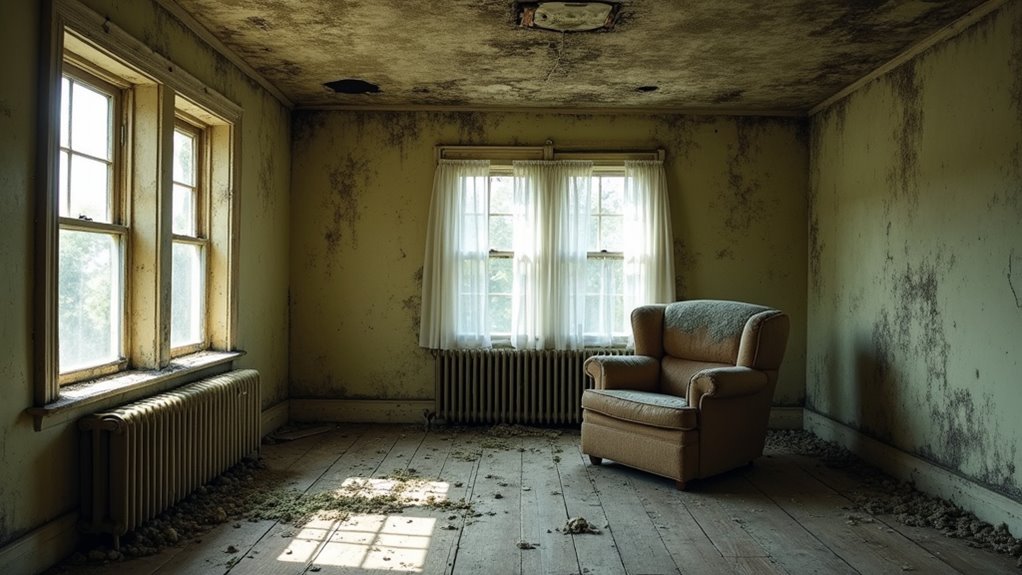
Mold and mildew commonly grow when water damage in vacant homes is not fixed. Empty houses often go unchecked, allowing leaks and moisture to build up. Mold can begin forming within one to two days of water exposure.
If mold grows, it can harm the building. Mold damages walls, wood, and insulation, which can lead to costly repairs. It may also lower the value of your property. In some cases, professional mold inspection is needed to determine the extent of the problem before selling the home.
Mold is also a health risk. Mold spores can trigger allergies and breathing problems for anyone entering the house. This makes the home less attractive to buyers.
If you delay cleaning up mold, removal costs increase. Mold removal can be very expensive if the problem grows. Taking steps to prevent mildew early helps protect your property and health.
Before selling a vacant home, it’s important to check for mold because legal requirements might impact your ability to transfer ownership smoothly.
Pest Infestations
You can’t ignore the financial impact rodents and insects have on vacant properties—studies show homes left empty for just a few months see a sharp rise in pest activity. Rodent damage to wiring, insulation, and structural elements can lead to repair costs exceeding thousands of dollars. At the same time, unchecked insect infestations multiply quickly, further eroding your home’s value and appeal to buyers.
Vacant homes are also at a higher risk of developing foundation issues due to neglected maintenance, which can further lower property value and make the home harder to sell. If you’re facing these issues, some O’Fallon home buyers will purchase your house as-is, saving you from costly repairs and additional loss of value.
Rodent Damage Risks
Vacant homes face high risks of rodent damage. Rodents enter through small gaps and cracks when no one is there to stop them. If homes are empty for over 60 days, rodent problems increase by 50%.
Rodents chew on wood, insulation, and wires, which can cause fires. Visible rodent damage can lower a home’s value by up to 10%. Their droppings and urine make indoor air unhealthy.
If you monitor and seal entry points, you can reduce these risks. Regular inspections help catch problems early. If you neglect these steps, damage and health risks will increase.
Insect Infestation Growth
Vacant homes are at higher risk for insect infestations because no one is there to notice early signs. Without regular checks, pests like termites, cockroaches, and ants can quickly spread. These insects cause faster damage and lower the property’s value.
Research shows that empty homes are 50% more likely to have severe infestations in the first year. DIY pest control often fails since insects hide and breed in hidden places. Professional help and regular monitoring are usually needed.
If homeowners manage moisture and seal entry points, they can slow pest growth. The table below shows how each insect can harm a home’s value.
| Problem | Impact on Value |
|---|---|
| Termite infestations | Expensive repairs needed |
| Cockroach growth | Breaks health guidelines |
| Ant colonies | Damages wires, insulation |
If these risks are ignored, homes lose value even faster. Early action is key to protecting vacant properties.
Vandalism and Theft
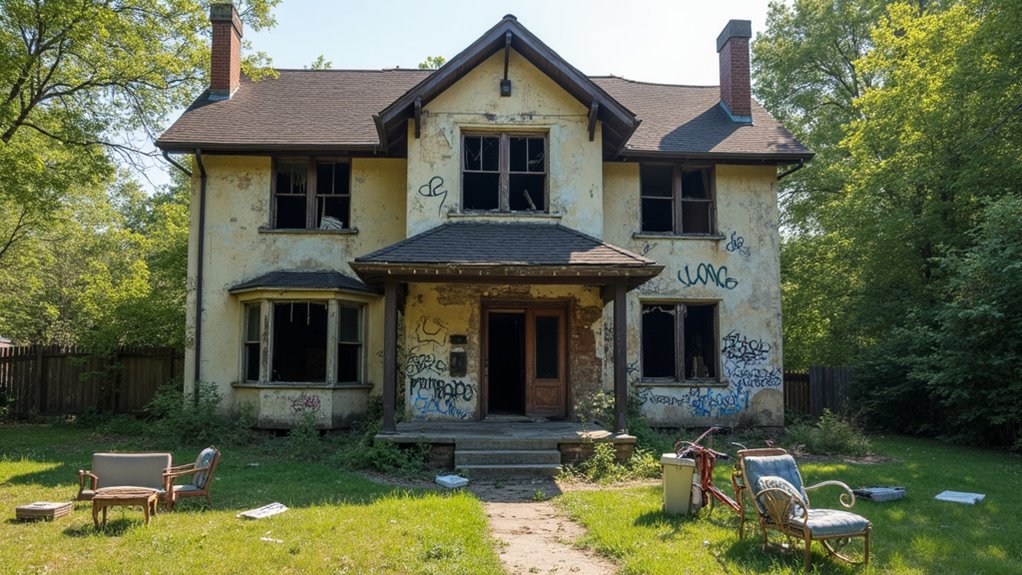
You’ll notice vacant homes attract a higher risk of break-ins, with studies showing unoccupied properties are up to three times more likely to be targeted by criminals. Graffiti and other forms of vandalism not only cause direct damage but also decrease neighborhood appeal, further driving down property values.
Additionally, vacant homes are often seen as prime targets by investors and house flippers who look for as-is opportunities, but this attention typically results in lower offers because buyers factor in the costs and risks of necessary repairs.
If you’re leaving a home empty, these threats can quickly turn into costly repairs and lost equity. Vacant homes in St. Charles County are especially susceptible to these issues, making it essential to consider reliable buyers who can offer a fair price and a hassle-free selling process.
Increased Risk of Break-Ins
Vacant homes are more likely to be broken into than homes with people living in them. Empty houses attract thieves, vandals, and trespassers. If a house is vacant, it faces a much higher risk of crime.
Lack of daily activity makes it easy for criminals to notice no one is home. Intruders often go unnoticed for days, giving them more time. Outdated locks or broken alarms may also make break-ins easier.
If you leave a home empty, its value can drop quickly. A vacant property is harder to keep safe and secure. Buyers often avoid homes that have been left unattended.
Damage From Graffiti
Graffiti can lower the value of vacant homes. Even one incident may decrease a home’s value by up to 15 percent. Removal costs about $1 to $3 per square foot.
Visible graffiti also signals neglect to others. This can attract more vandalism or theft if not addressed quickly. Preventive measures like lights or inspections help, but they require extra spending.
If a home stays vacant, risks increase over time. Costs for repairs and lost value can add up fast. Owners should act quickly to prevent further damage.
Declining Curb Appeal
Vacant homes lose curb appeal quickly. Poor curb appeal often causes a home’s value to drop. Buyers may avoid these homes if they look unattractive.
Unmanaged yards can make the house look abandoned. If lawns grow tall or plants die, people may think the home is not cared for. Pests may move in if the landscaping is neglected. Vacant homes may also attract major repairs if small problems are left unchecked.
Broken or missing lights make a house seem unsafe. Buyers may worry about security at night. If exterior lighting fails, people may skip viewing the home.
Debris or dirt buildup makes the property look old. If trash collects, first impressions will suffer. Buyers may offer less money for homes in poor condition.
Working with local home buyers who purchase houses as-is can help homeowners avoid the negative impact of declining curb appeal.
Stale and Unpleasant Odors
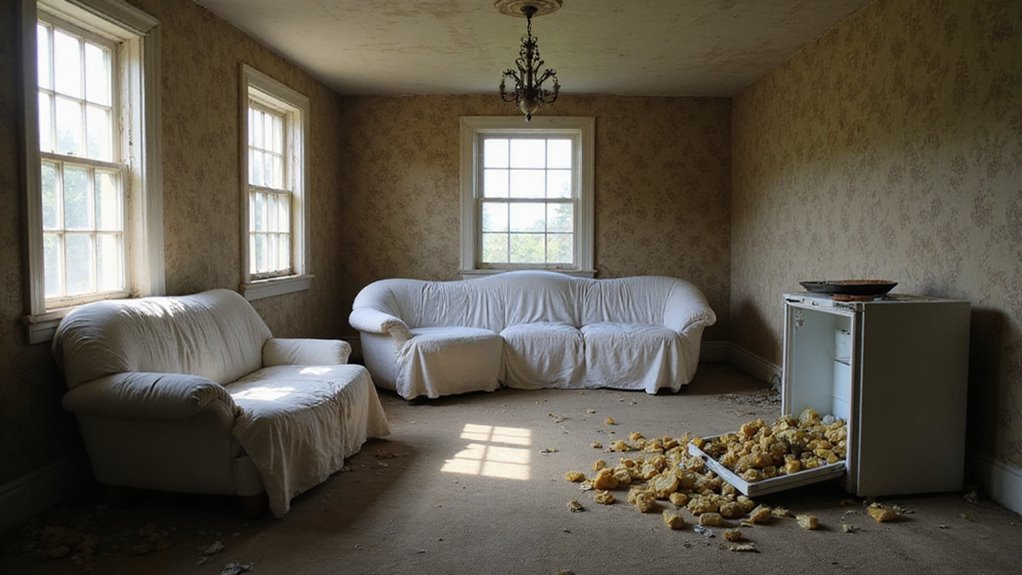
You’ll notice that vacant homes often develop stale and unpleasant odors, largely due to unchecked mold and mildew growth. Without regular air circulation, humidity builds up, accelerating these problems and creating an environment that deters potential buyers.
Data shows that properties with persistent odors can lose up to 10% of their market value, underscoring the financial impact of poor indoor air quality. In some cases, multiple owners or special circumstances, such as the presence of mold, can further complicate the selling process and affect the final sale price.
If you’re considering selling a vacant home, it’s important to understand how capital gains tax on real estate could impact your profit when odors or other issues affect your sale price.
Mold and Mildew Growth
Mold and mildew grow quickly when a home is empty, especially with poor air flow or hidden water. These problems lower a home’s value. Mold can decrease home prices by 10-30%.
If water leaks go unnoticed, mold can start in just one or two days. Mold damages walls, wood, and furniture, which leads to expensive repairs. Buyers avoid homes with visible mold because of health risks.
Homes with mold often take longer to sell and receive lower offers. Addressing mold early can help prevent further value loss. Ignoring the issue only makes the problem worse.
Trapped Air Circulation
Poor air circulation happens when air does not move freely in a home. This usually leads to stale air and bad smells. If a home is left empty, the air gets trapped and odors build up.
Windows and doors that stay closed make the problem worse. HVAC systems that are turned off do not help move air. Small gaps under doors or around windows are not enough to fix this.
If odors stay in the air, people may not want to buy or rent the home. Studies show that most buyers care about how a home smells. If you want to keep your home appealing, you need to improve air circulation.
Utility System Deterioration
Utility systems in empty homes often get worse quickly. Plumbing, electrical, and HVAC parts need regular use and care. Without this, these systems can fail faster than you might expect.
Studies show homes left empty for six months lose about 15% energy efficiency. They also face more risk of expensive repairs. This happens because problems go unnoticed and worsen over time.
Homes left empty for six months lose efficiency and face a higher risk of costly repairs as unnoticed problems get worse.
If you skip routine checks, plumbing may leak or pipes may burst from still water or changing temperatures. Electrical wires can corrode or short, which is dangerous. HVAC systems may collect dust and dry out, causing poor performance.
If you plan to leave a home vacant, regular system checks can prevent damage. Simple maintenance now avoids bigger problems later. Consider setting reminders for these checks if the home will be empty.
For homeowners considering a sale, working with trusted home buyers who purchase properties as-is can help you avoid the mounting repair costs and hassle that come with vacant homes.
Insurance Complications
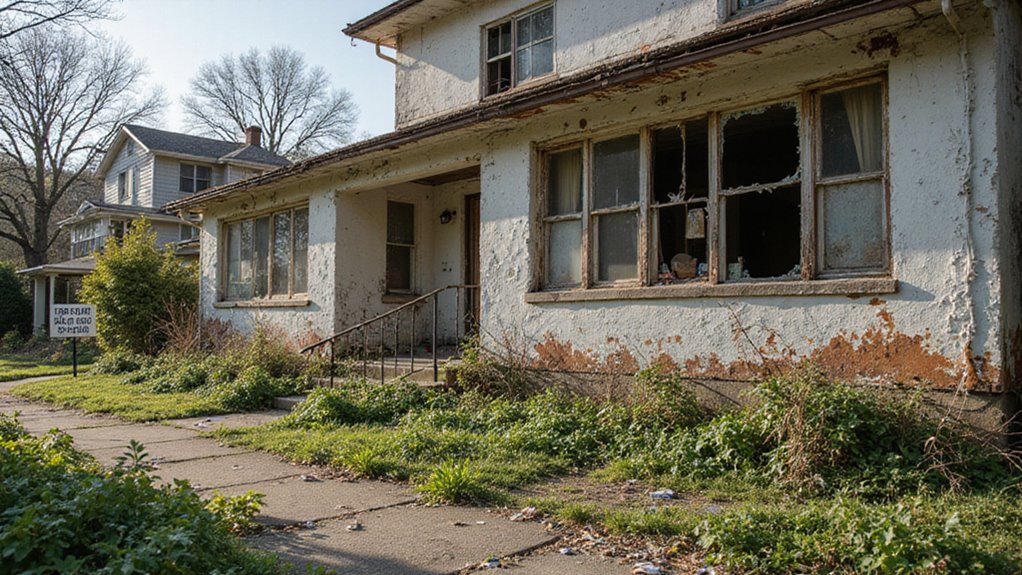
You’ll face stricter insurance requirements when your home sits vacant, often finding limited coverage options compared to occupied properties. Data from major insurers show that premiums for vacant homes can be 50% higher due to increased risks. This added expense and restricted coverage directly impact your property’s long-term value and marketability.
Limited Coverage Options
Vacant homes have fewer insurance options than lived-in homes. Insurance companies see empty homes as a higher risk. As a result, they often charge more and provide less coverage.
If your house is empty, you may not get protection for theft, water damage, or liability. Some companies will only cover a vacant home for 30 or 60 days. You may need to buy special insurance just for vacant homes.
Finding this type of insurance can take extra time and effort. If you do not meet policy rules, your claims could be denied. Always check the policy details before leaving your home empty.
Higher Premium Rates
Vacant homes usually have much higher insurance costs than lived-in houses. Insurance companies often charge 50% to 60% more for these policies. This rate increase is because insurers see vacant homes as a bigger risk.
Vacant homes face more danger from theft, vandalism, or unnoticed damage. If nobody is there to respond, small problems can quickly get worse. Insurers raise rates to cover the chance of bigger claims.
If your property is vacant, expect higher holding costs from insurance. These extra expenses can make your home less attractive to buyers or investors. Over time, higher premiums can lower your property’s overall value.
Missed Maintenance and Repairs
Missed maintenance and repairs can quickly lower a vacant home’s value. If a house is left empty, small issues often go unnoticed. These problems can grow into expensive repairs and make the house less appealing.
Neglected landscaping can lead to overgrown yards and attract pests. If the lawn and plants are not maintained, buyers may assume the property is abandoned. Poor curb appeal can make it harder to sell the home.
Unpainted exteriors expose siding to rain and sun. Moisture can enter, causing wood to rot and weaken the structure. If painting is ignored, the house can lose significant value.
Minor leaks or cracks may seem small at first. If no one fixes them, water damage can spread and repairs become costly. Studies show that a vacant home can lose up to 10% of its value in one year due to missed upkeep.
Neighborhood Impact and Stigma
A vacant home in a neighborhood often signals neglect. It can make the whole area look less appealing and trustworthy. If many homes are empty, the neighborhood may gain a negative reputation.
Homes near vacant properties can lose value. The Urban Institute found that houses within 150 feet may lose up to 1.3% of value each year. This loss can make it harder for people to sell their homes.
If people believe the area is unsafe or unattractive, they may not want to move in. This stigma can discourage investment and maintenance on nearby houses. Over time, the neighborhood may decline even more.
When more homes stay empty, the overall neighborhood value drops. New residents may be less likely to choose this area. Rejuvenation becomes more difficult as the cycle continues.
Legal and Regulatory Issues
Legal and regulatory problems make dealing with vacant homes difficult. These issues can lower your property’s value and create extra costs. If you ignore them, the situation often gets worse.
Title deed problems can delay the sale of your house. Missing or disputed documents make it hard to transfer ownership. Buyers may avoid properties with unclear ownership.
Unpaid property taxes add up fast. If you do not pay, the city may place a lien or start foreclosure. This can reduce your equity and scare off buyers.
Vacant homes must still follow city codes. If repairs or safety rules are ignored, you may get fines. These penalties further reduce the property’s value.
Decreased Marketability
A vacant home is harder to sell. Buyers often worry about possible problems or neglect when they see an empty property. This can lead to fewer visits and lower offers.
Vacant homes usually lose value faster than occupied ones. If a home stays empty for a few months, it may develop visible damage. Overgrown yards and a lack of furniture make it less appealing.
The table below lists main factors that lower a vacant home’s value. Common issues include poor upkeep, security worries, and long listing times. If these factors are present, buyers may see the property as a risky choice.
It is important to understand these risks when pricing a vacant home. If owners address these issues, they may attract more buyers. Proper care and staging can help improve the home’s marketability.
Strategies to Preserve Home Value
Vacant homes can lose value if not managed well. Taking the right steps helps keep your property in good condition. These actions also support a better selling price.
Professional home staging can help a property sell faster and for more money. Staging shows buyers how they might use each space. It also helps reduce the empty feeling of a vacant house.
Routine maintenance is important for vacant homes. Regular checks and quick repairs stop small problems from growing. This keeps repair costs lower over time.
If a home will be empty for a while, consider renting it out. Renting can prevent vandalism and bring in some income. Occupied homes also stay in better shape.
Conclusion
If homeowners leave properties vacant, those homes will often lose value quickly. Neglect and lack of maintenance can cause problems to multiply fast. If you wait too long, your property may become much harder to sell.
If you want to avoid further loss, you should consider your options now. Selling to a cash buyer can help you save time and money. We buy houses for cash, making the process simple and stress-free.
If you are ready to protect your investment, we are here to help. Freedom Path Investors can give you a fair cash offer for your property. Contact us today to discuss how we can assist you.

